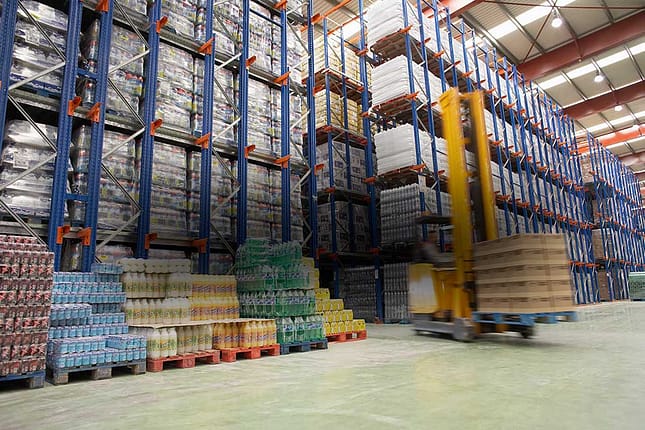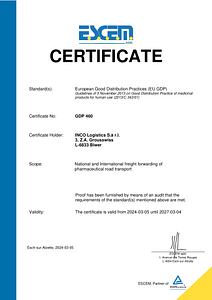A bonded warehouse is a secure and monitored facility where goods are stored under suspension of duties and taxes until they are ready for release. Bonded warehouses play an important role in long-distance transport and international supply chain logistics, as they allow companies to store their products without having to pay duties or taxes until the product is needed. By using this type of storage, you can save on the cost of transporting goods back and forth between different countries.
We take care of both the disposal of your goods from production to a strategic warehouse, the commissioning and inventory management as well as the supply of your goods to the end customer.
Our logistics department will be happy to advise you and create an individual logistics concept according to your specifications.
What types of goods can be stored in a bonded warehouse?
Various types of goods can be stored in a customs warehouse. The main characteristic of these goods is that they have not been taxed or cleared in the European Union (EU) and they may not be subject to import duties or VAT while stored in the bonded warehouse. Here are some examples of the types of goods that can be stored in a bonded warehouse:
Imported goods: Goods that have been imported from countries outside the EU and for which import duties or VAT have not yet been paid can be stored in a bonded warehouse.
Raw materials: Raw materials or components that are to be imported into the EU but have not yet been cleared or taxed can be temporarily stored in the customs warehouse before being released for free circulation in the EU.
Finished products: Finished products that have been imported from non-EU countries and have not yet been released for free circulation in the EU can also be stored in the customs warehouse.
Perishable goods: Some bonded warehouses specialise in storing perishable goods such as food or pharmaceutical products that require special storage before being cleared through customs or taxed.
Luxury goods: Luxury goods such as jewellery, watches or high-end electronic equipment that have been imported and have not yet entered the EU can be stored in the bonded warehouse.
Vehicles: Vehicles that have been imported and have not yet been released for free circulation in the EU.
What are the advantages of a bonded warehouse for companies?
Using a bonded warehouse offers businesses a variety of benefits that can help optimise warehousing, trade and the supply chain. Here are some of the main benefits a bonded warehouse offers businesses:
Avoidance of import duties and VAT: The main advantage of a bonded warehouse is that the stored goods do not have to pay import duties or VAT in the European Union (EU) during storage. Duties are only incurred when the goods are released from the bonded warehouse into free circulation in the EU.
Storage flexibility: A bonded warehouse offers companies the possibility to store goods for an unlimited period of time without the need for a customs declaration or customs clearance. This allows for flexible storage and planning of imports and sales.
Improved liquidity: By avoiding import duties and VAT during storage, companies can improve their liquidity as they do not have to pay duties until the goods are actually placed on the market.
Better inventory control: A bonded warehouse offers companies the opportunity to better control their inventory, as goods do not have to be cleared immediately upon arrival. This enables efficient stock management and can help avoid overstocking or shortages.
Simplified logistics and supply chain: By using a bonded warehouse, companies can
What role do customs warehouses play in the supply chain and the movement of goods?
Customs warehouses play an important role in the supply chain and movement of goods, especially in international trade activities. They serve as strategic intermediaries that allow companies to store, process and distribute their goods efficiently while delaying or avoiding the payment of import duties and VAT. Here are some key roles that bonded warehouses play in the supply chain and movement of goods:
Storage flexibility: bonded warehouses offer businesses the flexibility to store goods indefinitely for a period of time without the need to complete customs formalities immediately. This enables efficient planning of storage and better adaptation to fluctuations in demand.
Duty-free transfer: Within a bonded warehouse, goods can be transferred, sorted or further processed without customs declarations or duties being incurred. This allows for efficient use of warehouse space and better allocation of goods for shipment.
Delay of duties: The main advantage of a bonded warehouse is that import duties and VAT are not immediately due during storage. This improves companies’ liquidity and offers the possibility to store goods more cost-efficiently.
Simplified logistics: bonded warehouses can act as distribution centres from which goods can be quickly shipped to destinations without additional customs clearance.
Bonded warehouse
A bonded warehouse is a secure and monitored facility where goods are stored under suspension of duties and taxes until they are ready for release. Bonded warehouses play an important role in long-distance transport and international supply chain logistics, as they allow companies to store their products without having to pay duties or taxes until the product is needed. By using this type of storage, you can save on the cost of transporting goods back and forth between different countries.
We take care of both the disposal of your goods from production to a strategic warehouse, the commissioning and inventory management as well as the supply of your goods to the end customer.
Our logistics department will be happy to advise you and create an individual logistics concept according to your specifications.





